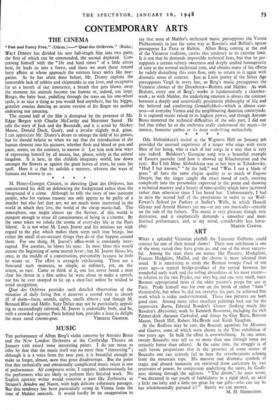MUSIC
THE performance of Alban Berg's violin concerto by Antonio Brosa and the New London Orchestra at the Cambridge Theatre on January rith raised some interesting points. I do not mean to infer by that that the music itself was no more than " interesting " ; although it is a voice from the near past, it is beautiful enough to make us forget, almost, even that great disadvantage. But the point that this technically and emotionally complicated music raises is one of performance. All composers write, I suppose, subconsciously for the performers who are likely to perform their finished work. No English operatic writer would conceive a part like Zerbinetta in Strauss's Ariadne auf Naxos, with high delicate coloratura passages. But this tendency has been particularly strong in Vienna from the time of Mahler onwards. It would hardly be an exaggeration to say that most of Mahler's orchestral music presupposes the Vienna Philharmonic in just the same way as Rossini's and Bellini's operas presuppose La Pasta or Rubini. Alban Berg, coming at the end of the Viennese tradition, carries this tendency to its extreme limit. It is not that he demands impossible technical feats, but that-he pre- supposes a certain velvety sweetness and deeply unified homogeneity of tone as the normal orchestral tone, and obtains many of his effects by rudely disturbing this even flow, only to return to it again with dramatic sense of contrast. Just as Latin poetry of the Silver Age presupposes Virgil in every line, so Berg's music presupposes the Viennese classics of the Decadence—Brahms and Mahler. As with Brahins, every one of Berg's works is fundamentally a chamber- work ; as with Mahler, the underlying emotion is always the contrast between a deeply and neurotically pessimistic philosophy of life and the beloved and comforting Gemiillichkeit—which is almost cosi- ness—of everyday Vienna and the neighbouring Austrian countryside. It is regional music raised to its highest power, and though Antonio Brosa mastered the technical difficulties of the solo part, I did not feel that either he or the orchestra really understood the music—its intense, feminine pathos or its deep underlying melancholy.
* *
Oda Slobodskaya's recital at the Wigmore Hall on January 9th provided the unusual experience of a singer who sings with every fibre of her being, who is each of her songs in a way that is very rare indeed. Balakirev's Georgian song was a beautiful example of Eastern pastiche (and how it showed up Khachaturian and the rest). But I felt Mme. Slobodskaya was at her best in Tchaikovsky. "Had I but known," " At the ball," and " Was I not a blade of grass " all have the same elegiac quality as so much of Eugene Onegin, but the singer caught the exact mood of each, entering completely into the personality expressed in the poem and showing a technical mastery and a beauty of tone-quality which have increased rather than otherwise since I last heard her. Unfortunately, I had to miss the second half of the programme in order to see Wolf- Ferrari's School for Fathers at Sadler's Wells, in which Howell Glynne and Arnold Matters put me—at any rate musically—entirely on the side of the fathers. The music is very pleasant though very derivative, and it emphatically demands a smoother and more finished performance, and, to my mind, considerably less horse-


































 Previous page
Previous page